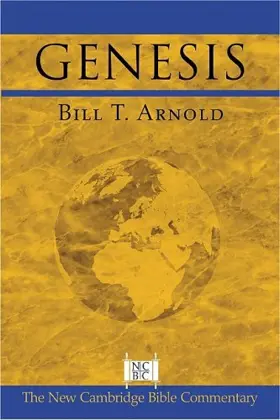

Genesis
in New Cambridge Bible Commentary
Pages
408 pages
Publisher
Cambridge University Press
Published
1/1/2009
ISBN-13
9780521000673
Reviews
I was leading a bible study and preaching parts of Genesis, and of all the commentaries I looked at (others being WBC, NCBC, NICOT, and Interpretation), I found this commentary to consistently provide the exegetical data on the questions that I personally had and felt the congregation might have. The other commentaries are great, don't get be wrong, but didn't really focus on questions that I feel like lay people might be asking about the passages, and were more geared toward academia. The theological analysis is conservative, and on the topics it does choose to cover, it is thorough enough as a reference for checking your own exegesis. Obviously this is best used in conjunction with other commentaries to provide more depth and other commentaries might do a better job on certain verses, but if I had to choose just one Genesis commentary as I preach/teach through it, I would choose NCBC.
A very well written commentary and extremely valuable commentary on Genesis. Bill Arnold packs a tremendous amount of insight into this slender volume. He tends to find significant details in the Biblical narrative that the lay reader would tend over look. These insights often illuminate the entire narrative. I found this commentary a pleasure to read. However, this commentary cannot stand on its own. Due to space constraints in this series, this commentary serves as an excellent compliment to a more comprehensive commentary such as Wenham or Hamilton. On the other hand, because of his keen insights, your Genesis library will not be complete without it.
This commentary presents the reflections of a scholar who has listened closely to the Book of Genesis. His examination of the text repeatedly combines critical insight with judicious assessment of the evidence.
[Full Review]
This is an eminently readable and enjoyable commentary on the book of Genesis by a scholar who is a moderate adherent of the idea that Genesis is a book that has been put together from various sources, which can be connected with historical realities, and who makes liberal use of ancient Near Eastern sources to throw light on Genesis. He makes his own point of view clear in the first chapter of his book, an “Introduction” (1–19), where he sets forth his view of the origin of the book; a condensed version of this introduction appeared on the Bible and Interpretation website: http://bibleinterp.com/articles /genesis.shtml. The section on “Literary Studies” in the second chapter, “Suggested Readings on Genesis” (20–26), is very brief, covering barely two pages, like the other sections in this chapter, but in contrast with these other sections I would have liked to see more consideration of literary issues. I think that here the author is hindered by the historical-critical tradition he is in, for while the work of several of the authors whom he mentions may not address historical issues in the text at all or in a manner that is not entirely satisfactory, they not rarely raise issues that should be addressed in any case and that receive little and sometimes no attention in this commentary.
[Full Review]

